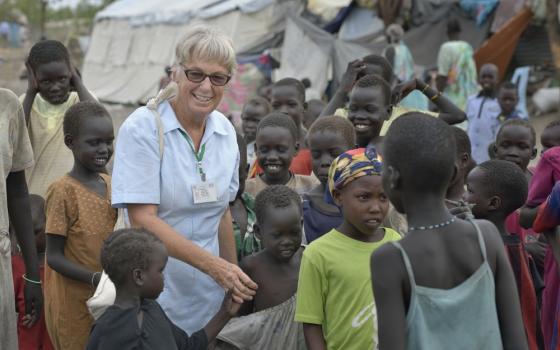Earlier this year we reported that an uneasy peace seemed to have come to South Sudan, though the war-torn country’s troubles were many and both the government and rebels were rumored to be re-arming.
Now comes word that fighting has, indeed, again erupted.
Solidarity With South Sudan Executive Director De LaSalle Christian Br. Bill Firman writes that the fighting in Malakal is not between government forces and rebels, but between different factions of government fighters. Malakal is in the Upper Nile state in the northeast part of South Sudan.
Meanwhile, the costs of imported commodities have been increasing rapidly as the South Sudan Pound loses value against the Dollar. Since most of the food and other goods sold in South Sudan came from neighbouring countries, the economic impact of the war is now being felt by everyone. It is a senseless and stupid situation, the consequence of a view of man so contrasting to that described in Hamlet’s monologue. Human life is undervalued by too many in South Sudan. We must work to build a vision based on the dignity of human beings, ‘paragons’ created in the likeness of God. This is the key to establishing a lasting peace and prosperous society in South Sudan. It can be done. It must be done.
The fighting, of course, means that humanitarian aid to the victims of war takes a hit: Religion New Service reports that World Vision, Doctors Without Borders and numerous other agencies have suspended operations because of killings, rapes and abductions in nearby Unity state, in the north central part of the country.
RNS reports that on May 13, gunmen torched several towns in some of the heaviest fighting in the 17-month-long conflict.
“We estimate that more than 10,000 children under 5 face malnutrition and nearly 300,000 throughout Unity State are left in need of aid,” World Vision acting national director Samar Abboud told RNS.
Firman said the latest fighting shows the conflict is only about power and a disregard for human life:
In 2015, there has been less fighting but the divisions and self-interest have become even more evident. Some of the generals initiated compulsory conscription from among their own people of young men and boys and, in some reported instances, even women and girls. South Sudanese families who normally show a great ability to live together in peace, trust and harmony, were now being torn apart by the soldiers on their own side of the ethnically based conflict. Those who were supposedly protecting their own tribe were now destroying it.
Happy cows, abused workers
When I think of dairy farms – perhaps thanks to great marketing by the industry – I think of happy cows. I think of rolling green pastures in Wisconsin and Vermont, with cows munching lazily on grass. I think of all the wonderful cheese that will result.
But perhaps I should be thinking of unfair labor practices, workers rights and horrible working conditions, especially for migrants.
The Nation reports that grassroots group Migrant Justice is working “to push a comprehensive labor monitoring plan for the dairy labor force, which would establish standards on wages and labor conditions set by workers themselves, supported by independent auditing, worker education, and a scheme for equitable profit-sharing among workers and farmers.” The campaign is called Milk With Dignity.
For Vermont’s 868 dairy farms, with some 1,200 to 1,500 migrant workers, MWD seeks not only higher wages but also decent housing and leave times, protection from discrimination and greater autonomy and a say in their working conditions.
According to Migrant Justice’s survey of 172 dairy workers, about 40 percent earned less than the state minimum wage of about $9. Roughly a third observed that they were treated worse than US-born workers. And with workweeks averaging about 60 to 80 hours and frequent injuries, the labor conditions were not only harsh but also hostile, with some reporting verbal abuse and being denied medical care or even a break for the bathroom or eating.
And the biggest target for their push? One of the most feel-good companies in the country, Ben & Jerry’s:
Ben & Jerry’s has long been the quintessential Vermont brand, built on wholesome corporate values and hippie sensibilities by the pint. But labor advocates say the ice-cream empire’s socially minded branding is greased with the sweat of an exploited workforce, rotten with poverty wages, squalid housing, and abusive bosses.
The story says one of Ben & Jerry’s main suppliers is the St. Albans Cooperative, a network of 430 dairy farms in New York and Vermont, including some known for their unsavory labor practices. But the group’s efforts to work with Ben & Jerry’s have gone nowhere, with the company not doing much more than adapting talking points and praising good practices already being used, but doing nothing about abusive ones.
When it became clear the company wasn’t interested in adopting real standards, the group went public about the beloved ice cream company’s reluctance. But there’s been no talk of boycotts or other actions, just a public airing of grievances and a reminder that when Ben & Jerry’s is ready to talk about real change, Migrant Justice is willing and waiting.
Remember, links, tips and accounts of the response to any crisis anywhere in the world are always welcome at [email protected].
[Dan Stockman is national correspondent for Global Sisters Report. Follow him on Twitter @DanStockman or on Facebook.]

